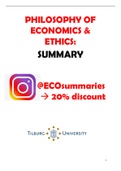Samenvatting
Philosophy of Economics & Economic Ethics - Summary - Tilburg university - Economics
- Instelling
- Tilburg University (UVT)
- Boek
- Ethics and Economics
Instagram: ECOsummaries DM me for 20% discount! Summary for the course ''Philosophy of Economics & Economic Ethics''. This summary was written in order to study for the final. Everything you need to know is available in this summary. Advice: also study the paper and book to fully understand all ...
[Meer zien]






